Fasting Before Chemo: Pros and Cons
February 6, 2023 by Ginger Hultin MS RDN
I get a lot (LOT) of questions about fasting before chemo and I’d love to discuss it here with you. The research keeps coming out about how it could be beneficial – but exactly for who? For how long? For what kind of treatment? Is it right for everyone? I’ve got clients fasting and not fasting so I want to lay out all the considerations here in the post regarding fasting before chemo. But before we go any further, remember: your medical team always has the final say about your treatment and eating patterns.
As a cancer nutrition expert, I’m not here to deny someone’s lived experience, but I am here to give people evidence-based information on this topic. What I can tell you is that sweeping claims that fasting before chemo cures cancer are not backed by science. We simply don’t have enough evidence to say it’s safe or effective and we know nothing about the long-term effects of fasting on cancer or any other condition. There’s certainly some interesting research out there around fasting and cancer, it may be appropriate for some people but for many, you need to use a lot of caution (a lot).
Fasting before chemo and during treatment can actually be incredibly dangerous for people in active treatment. Since fasting is used as a tool that can also lead to weight loss, and people with cancer are already at risk for unintentional weight loss and malnutrition, it can make things worse and put your health at risk.
The bottom line is that you should never attempt fasting without professional support, and it’s not a recommended treatment for people who are dealing with weight loss, muscle loss, and malnutrition as a side effect of treatment. I can’t stress enough that just because it worked for a friend or someone on TV doesn’t mean it will work for you, too. I want you to be safe so please always make sure you’re getting individualized information tailored to your specific situation. Registered dietitians like me and open-minded doctors can help you weigh the pros and cons of considering fasting for your unique situation. But let’s discuss….
What is fasting?
Fasting is an ambiguous term that can mean a lot of things. Basically, fasting means not eating food for a designated period of time. I get so many questions that I even wrote a whole blog post on it, but here’s a short summary of the different types:
- 5:2 (twice-a-week): This is the most popular form of fasting where you limit your calories to about 500 per day, twice per week. You can eat regular, healthy meals without restrictions on the other five days.
- Alternate day fasting: You eat 500 calories per day, every other day. Some people even choose to eat nothing at all on fasting days. You can eat regular, healthy meals without restrictions on non-fasting days.
- 24-hour fasting: You don’t eat for a full 24-hour period, usually one or two days per week. The 24-hour period can be breakfast to breakfast, lunch to lunch, or dinner to dinner. You can eat regular, healthy meals without restrictions on non-fasting days.
- Time-restricted fasting: This is the easiest form of fasting because you’re sleeping most of the hours you can’t eat. It’s also called 14/10 or 16/8 because you fast for 14 or 16 hours and then eat during a 10 or 8-hour window. Most people can accomplish this by just eating an early dinner and waiting a little bit longer to eat in the morning. You can do this one or more days per week.
The claims around fasting and cancer
Now you know that fasting in the most simple terms means depriving the body of food. Before you can understand why this might be good for cancer, you have to understand how food deprivation changes the way the body works.
Food is the fuel that keeps the body running. It’s like gasoline for a car. When the body doesn’t get enough fuel from food because it’s fasting, it’s forced to use up the fuel that’s already stored inside the body: sugars, fats, and proteins. The body first takes sugar from the liver, then fat from the fat cells, and then protein from the muscles. Why is this a big deal? Because the body isn’t meant to operate this way, so using up its internal fuel stores like this is actually really stressful on the body.
Some research is showing this might be beneficial during cancer treatment. The theory is that healthy cells respond to the stress of fasting in a way that makes them more resistant to the toxic effects of chemotherapy. Cancer cells, on the other hand, simply can’t adapt because they need a lot of nutrition to live and grow. They end up getting damaged while healthy cells come out unscathed.
For this reason, researchers think fasting could make treatments like chemotherapy and radiation more effective while also reducing their toxic side effects, making it much more tolerable and improving overall quality of life. But there are a bunch of other reasons scientists think fasting can be effective for treating and preventing cancer, and they are that fasting does the following:
- Slows or stops cancer progression
- Lowers levels of glucose (sugar) and insulin in the blood. This is significant because high levels of both play a role in cancer risk
- Boosts the immune system so it’s better able to fight cancer
- Lowers inflammation, which is a hallmark of cancer
- Reverses the effect of chronic conditions like obesity and Type 2 Diabetes, which are risk factors for cancer
So how true are all of these claims? Let’s explore!
How Effective is Fasting for Cancer or Fasting Before Chemo?
We don’t have enough evidence to come to any hard conclusions about fasting’s effectiveness for cancer in the short or long term. We need a lot (I mean, a lot) more research before we can even think about recommending fasting as a complement to cancer treatment. But let’s dig into some of the research we do have.
Most of the studies we have were done on animals like mice. They suggest that fasting can reduce the risk of certain cancers, slow the growth and spread of cancer, and reduce the side-effects of treatment. But let me state the obvious here: humans aren’t mice so we don’t know if these benefits apply to people.
The limited human research we do have shows that fasting is challenging in the cancer population but can be safe, feasible, and effective in reducing the toxic side effects of cancer treatment. Some studies have reported that short-term fasting (usually defined as 1-3 days) can positively influence the risk or course of certain cancers, like breast and pancreatic. One study found that short-term fasting helped people with breast and ovarian cancer tolerate chemotherapy better and improved fatigue and quality of life. Most of these studies have been on really small groups of people so it’s hard to make generalizations for the entire cancer population.
There was a larger study done in 2016 on women with early-stage breast cancer reported that fasting less than 13 hours overnight was associated with an increased risk of breast cancer, compared with women who fasted 13 hours or more per night. But, interestingly, researchers did not find an increased risk of death from breast cancer or any other causes with that shorter fast. It’s really important to understand that this study only showed a correlation (a relationship) between fasting and cancer recurrence, not that a shorter fast caused the recurrence. This is an important distinction.
I know that research is tedious and confusing so I’ll sum it all up for you: we’ve got animal studies and some small human studies but right now, there’s simply not enough evidence to prove that fasting of any kind is safe or effective for people in active treatments. What we do know is that there are serious risks involved and that’s why fasting is not recommended during treatment, and certainly not as an alternative to treatment. Don’t get me wrong, it may be appropriate for some people but I want you to know the risks going into it.
The Risks of Fasting During Treatment
The very reason people without cancer choose to fast is why experts like me are so concerned about fasting within the cancer population: weight loss.
As a cancer dietitian who supports people through active treatment, I see a lot of people struggle with unintentional weight loss and a poor appetite. In fact, up to 80% of people with cancer are at risk for weight loss, loss of muscle mass, and malnutrition. That’s why it’s so important for these people to eat enough and eat regularly, otherwise they won’t meet their nutritional needs.
Weight loss aside, fasting has other side effects like headaches, dizziness, nausea, and weakness – things you might already be dealing with during treatment. I worry that when you compound the side effects of treatment with the potential side effects of fasting, you’ll put your health at risk, your quality of life will go down, and you’ll have a harder time getting through treatment. And let’s not forget that we don’t know anything about the long-term effects of fasting.
The Bottom Line
I hope it’s clear by now that fasting is not something you should attempt without the support of a professional (and probably a team of professionals). We have a lot of compelling claims and some preliminary evidence, but at this point the risks may outweigh the rewards. If you do find yourself really interested in fasting, please, please start by having a conversation with your care team. Experimenting with your body during treatment is not something you should take lightly.
I hope this information was helpful. If you have any questions, please comment below and we’ll continue the conversation.
3 Comments
Leave a Comment

Ginger Hultin,MS, RD, CSO
Thanks for visiting! If you're struggling with a cancer diagnosis, autoimmune condition, gut health problems, or even a medical mystery, nutrition can make a HUGE difference in your day-to-day life. I run a virtual, concierge private practice where I partner with my clients over time to help them improve their health through nutrition. Be sure to visit the blog for easy, plant-based, anti-inflammatory recipes and our "Resources" page for a variety of self-paced programs, books, e-books, and nutrition podcast episodes.

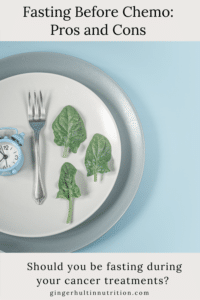
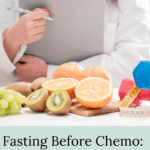
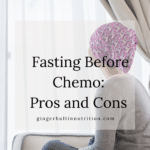
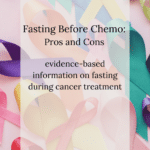

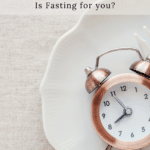
Thank you for this informative post on the pros and cons of fasting before chemotherapy. It’s an important topic that many cancer patients may be considering, and it’s helpful to have a better understanding of the potential benefits and risks.
Thanks for sharing your insights and knowledge on this important topic. It’s an important reminder that there are many factors to consider when it comes to cancer treatment, and having access to accurate information can help patients make informed decisions about their care.
Thanks so much for the kind words, Carol!